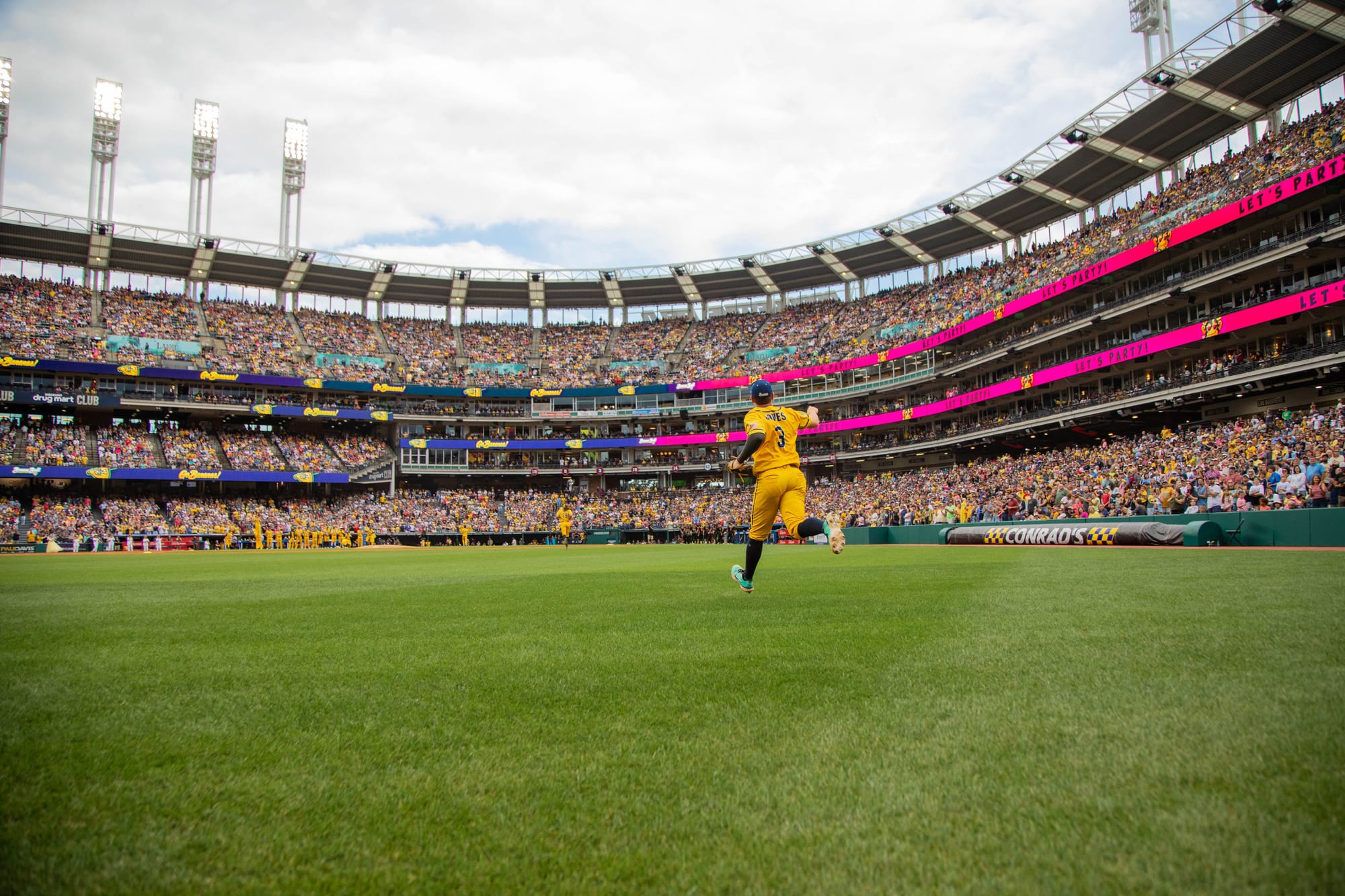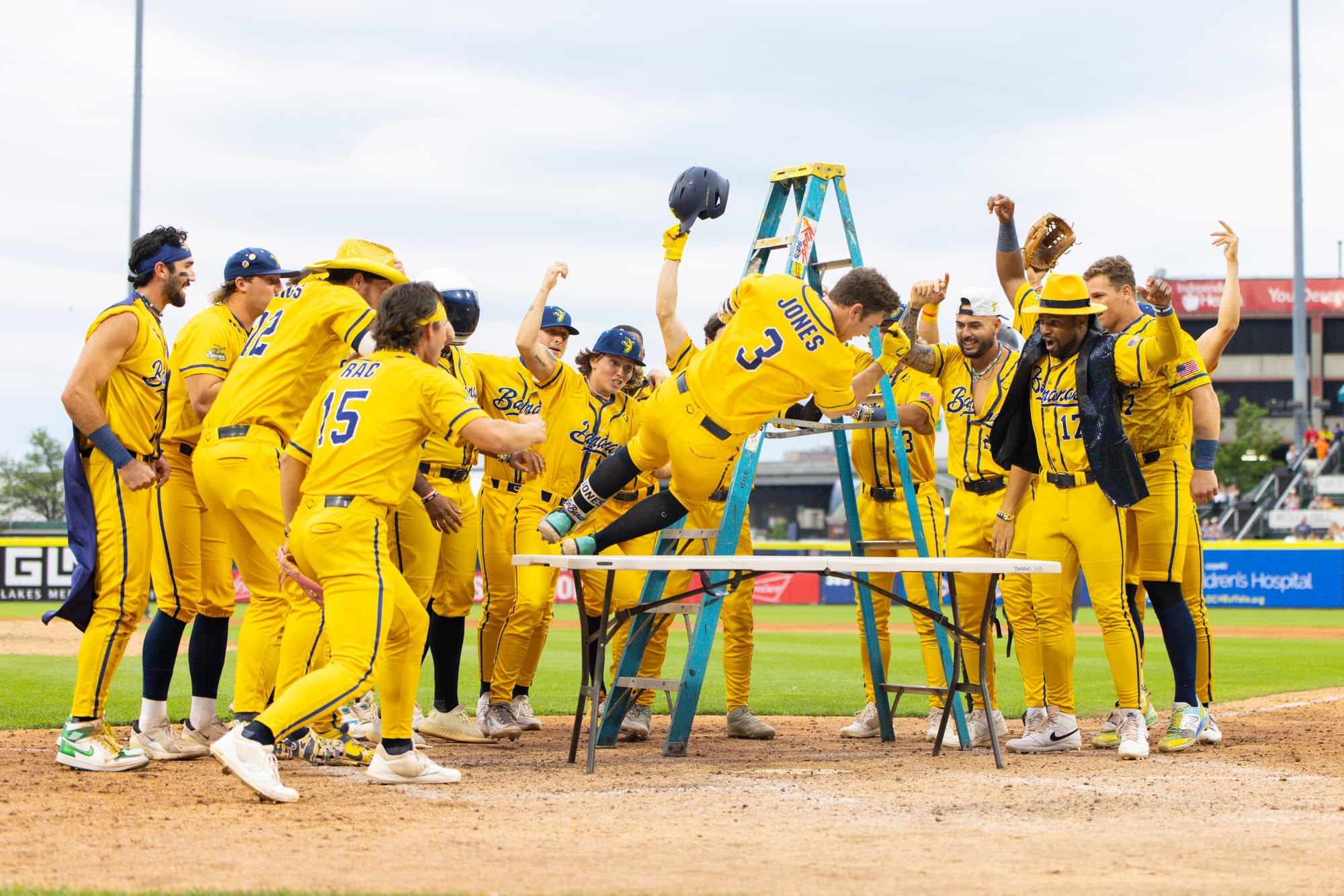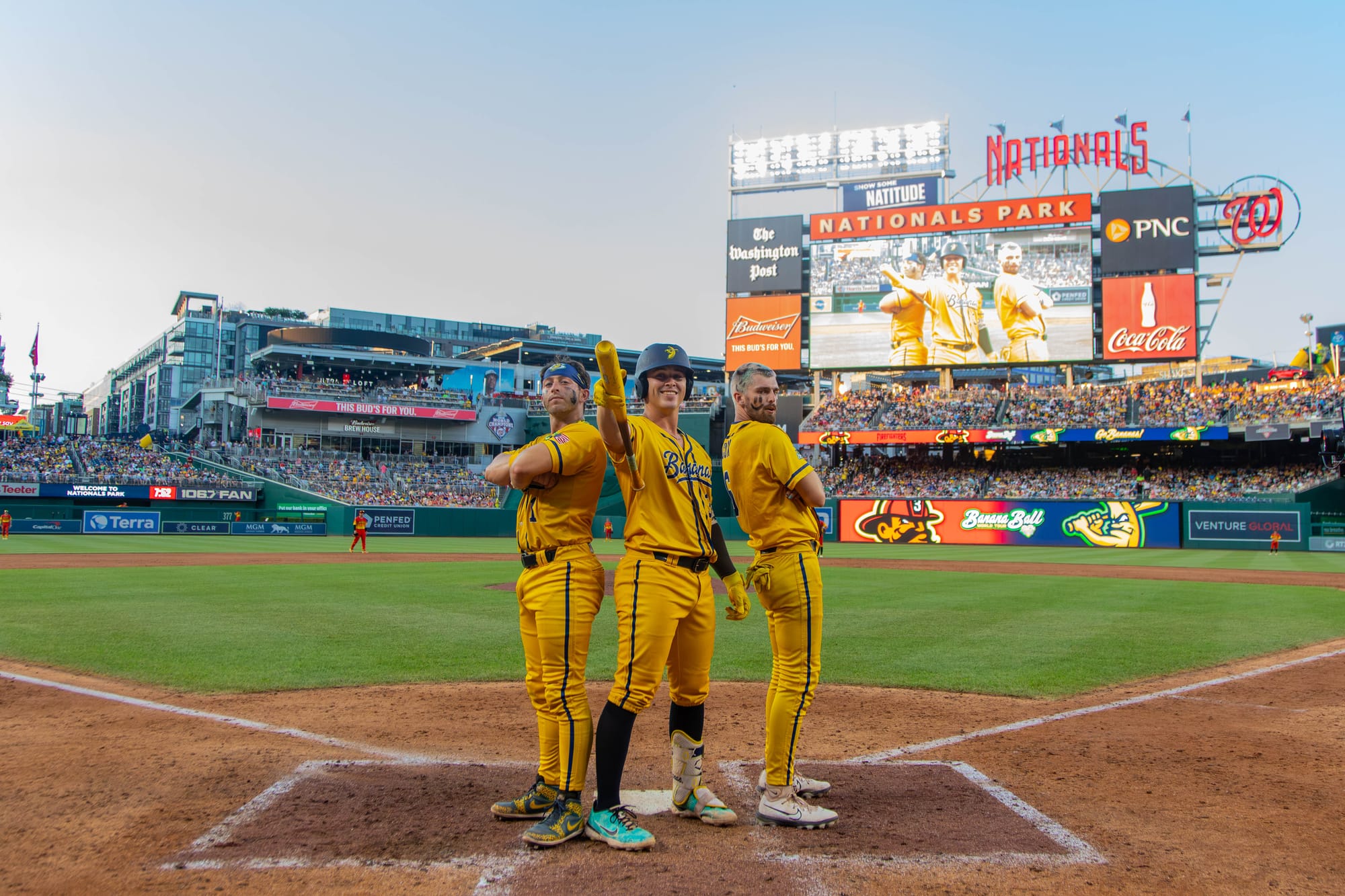Eric Jones Jr. has long dreamed of this moment. Sold out Major League Baseball stadium. The bright lights. Roaring crowd of 41,000 fans. He’s at the plate. Three-two count. Pitcher hangs a breaking ball. Boom!
“WHOA!” an announcer shouts. “Hasta la noche! EJ with a one-way trip to the Crawford Boxes!”
With a flick of the bat, Jones, the 28-year-old infielder for the eccentric Savannah Bananas baseball team, smashed his first home run in a major league ballpark. Jones airplanes around first base with a wide-eye smile before celebrating with a backflip at home plate.
It’s a full-circle moment for the Banana star after spending his career grinding through independent leagues, a tumultuous time in the minor leagues, and serving as a bullpen catcher for the Seattle Mariners. Now look at him celebrating a long ball that more than makes up for all those long days and nights on the road.

“Seeing over 41,000 people lose their minds over me hitting a baseball is still hard to comprehend,” Jones says. “You’ve gotta believe in yourself and you can accomplish anything.”
Only, if he’s being honest, this isn’t quite how he pictured it when he was a young boy playing Big League Star in his backyard. For starters, the bases weren’t loaded. It wasn’t the bottom of the ninth. The World Series wasn’t on the line. He didn’t send a ball soaring over the vaunted Green Monster at Fenway Park.
Instead, the pitcher — who moments ago was dressed in an all-pink jersey for the opposing Party Animals — ripped off his top and helicoptered it over his head after striking out the previous batter on three straight pitches.
All of this comes after an inning in which Roger Clemens — yes, that Roger Clemens, the now 61-year-old seven-time Cy Young winner — gave up five runs.
Is this all a dream? Hardly. It’s Banana Ball. And it’s revived Jones’s playing career.
Nicknamed Extra Juiceman Jr., Jones gives the Bananas a power bat. He’s Banana Ball’s all-time home run leader and hit the winning homer for the Bananas to claim the home run derby title at Fenway. But Banana Ball is so much more than stats and sabermetrics that dominate its major league counterpart. Jones is part of a team that wows crowds with its Willie Mays-style catches, its spontaneous dance parties on the field, or its pitchers throwing flaming baseballs.
The Bananas broke into the mainstream as a college summer league team founded back in 2016. It wasn’t long until they gained social media fame for their take on circus-esque baseball. Banana Ball, as it’s called, is laid back, hilarious, and entertainment at its highest form for the casual fan. Its founders dub it the “greatest show in sports.”
Where else in baseball will you find a first baseman interviewing a baserunner mid-game with questions like, “Where was your first kiss?”

Though it follows the basic tenets of baseball, Banana Ball adds more flare than the game seen through the eyes of Major League Baseball. There’s a two-hour time limit for all games, which features pitchers hurling pitches in such rapid succession it could make any MLB fan envious. (The Bananas claim to have the world’s fastest strikeout at 8.73 seconds. A pitcher for the Party Animals, the Bananas archrival, claims he owns the record at 6.05 seconds.)
The scoring system is also unique. The team that scores the most runs in an inning gets a point. The team with the most points at the end of the game wins. Other oddball rules include no bunting, no mound visits, batters can steal first base on any pitch of the at-bat, and any fan who catches a foul ball counts as an out.
“No one leaves a great movie in the middle of a movie. No one leaves a great concert in the middle of a concert. Yet for some reason people leave baseball games in the middle — every time,” Bananas founder Jesse Cole says, who’s known for his yellow tuxedo and top hat. “What is that saying? Maybe the game is a little bit too long, a little bit too slow, and a little bit too boring for too many fans. So, we had to change it.”
Jones heard about the Bananas but never saw himself as someone who would break out dancing in the middle of a baseball game. Not at that point in his career, at least.
He still had major league hopes, although he went undrafted out of Davidson College after an injury derailed his senior season. His parents convinced him to join the United Shore Professional Baseball League for a season, an independent league based out of Michigan where he could continue playing, prove himself, and maybe catch the eye of a professional scout.
Jones tore through the league and signed a minor league contract with the Minnesota Twins. He played five games in rookie ball before a hurricane swept through Florida and canceled the season. He’d have to wait for spring training to prove himself. Yet spring training was met by the COVID-19 pandemic, which shuttered the minor league baseball season and left Jones questioning what was next. While other independent leagues canceled their seasons, the Bananas played on. Soon, Jones found himself in Savannah, Georgia, donning a yellow-and-blue uniform with a fierce-looking, bat-touting banana daring you to hang a pitch.
“I had a blast,” Jones recalls today. “Even though it was during COVID, there were people in the stands, and it was a fun atmosphere.”

Jones finally got his first taste of Major League ball when he joined the Seattle Mariners as a bullpen catcher in 2022 after more time bouncing around independent leagues and the minors. Though he didn’t play, Jones got a first-hand look at life in the majors. Five-star hotels. Private flights. Every day he was walking into the most beautiful baseball stadiums in America.
Beyond the luxuries, Jones spent time in catcher’s meetings and helped game plan how to attack opposing batters. On the field, he worked with pitchers while reinforcing those plans. This was when the Mariners hit a hot streak, winning 14 straight games that led to the team’s first postseason berth in 21 years — largely thanks to its pitching. Jones was, by all accounts, an integral part of a Major League club.
But he still felt a calling as a player. The Mariners wanted him back as a bullpen catcher after the season, but Jones, 26 at the time, was frustrated.
“I was pretty clear from day one that I wasn’t interested in being a career bullpen catcher. I still knew I had good baseball to play,” Jones says. “I’m a player. I just showed you last year that I should be on track to the majors as a player. I’m not interested in not playing anymore. I want to play.”
He didn’t have any minor league prospects then and didn’t want to return to independent league ball. What was he to do? A friend on the team suggested playing full-time for the Bananas.
“He told me, ‘You can bullpen catch for the rest of your life. You have experience in the major leagues now, you’re a good guy, people like you,’” Jones recalls the conversation. “But he said, ‘The Savannah Bananas are on fire. If you have a chance, you can be an integral part of that.’”

It made a lot of sense to Jones. Even if he did get another minor league contract, even if he did make it to the majors, there was no guarantee that he would stay. Minor league players get called up for all sorts of reasons — injuries, to fill a roster spot because a struggling pro is sent down to work out some kinks — and sent back down just as quickly.
There were perks to Banana Ball, too. He’d be getting paid better than playing in an independent league, with 80-plus games traveling to stadiums across the country. A meeting with the Bananas owners didn’t hurt, either. They wanted him. They discussed big plans to sell out major league stadiums with passionate fans.
The allure of playing Major League Baseball was strong, but even Jones had to admit that playing Banana Ball made a lot of sense.
For a player who never envisioned himself breaking out in dance mid-game, Jones has fully embraced Banana Ball. He’s doubled down on trick plays (behind-the-back grabs or between-the-leg snags at first base), he’s jumped off a ladder onto a folding table sitting above home plate after a hitting a home run in New York (a tribute to Bills Mafia), and he’s suited up with wrestler/actor/funny man John Cena.
He's learned to “have fun with it. Let’s create cool moments and do awesome things on the field.”
With the Bananas, he’s accomplished so much more than he dreamed of as a little kid growing up in North Carolina who once hoped to play under the bright lights of a big league stadium. With the Bananas and rapidly growing Banana Ball, anything feels possible. Could he play into his 70s, like Bill “The Spaceman” Lee, the Boston Red Sox Hall of Famer who suited up for the Bananas last year? Playing ball is all Jones has ever wanted.
“The fact that I get to continue playing is everything,” he says. “That’s what I’m focusing on is my playing ability, keeping myself sharp and ready as a player.”
The dream of playing Major League Baseball still looms in the back of his mind, though he’s not interested in grinding through the lower levels of the minors or independent leagues to earn his spot. If he’s ever going to get his MLB call, it’s gonna be because of his play with the Bananas.
And if that call never comes, that’s okay, too, because he’s still playing in sold-out Major League stadiums on a world tour where fans cheer his name.
Advertising and sponsorship opportunities are available. Contact Jim Hoos at jhoos@r1s1sports.com or 602-525-1363.